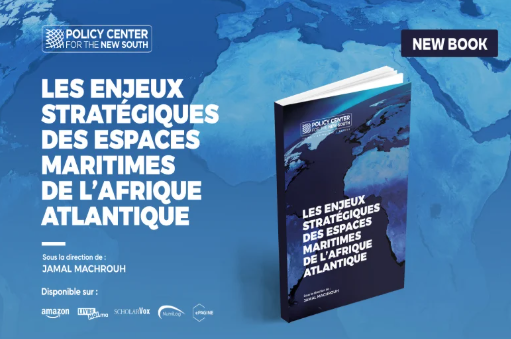The Policy Center for the New South (PCNS) has published a book titled The Strategic Issues of the Atlantic Maritime Spaces of Africa, compiling contributions from a debate-conference held by the PCNS on April 16, 2024, on the strategic challenges facing the Atlantic maritime spaces of Africa.
The book, developed by Jamal Machrouh, Senior Researcher at PCNS, explains that the debate-conference follows a dual logic: continuity and originality. Continuity because, since the creation of the think tank, the Atlantic has always been a permanent area of reflection, study, and analysis for the Policy Center. Originality, on the other hand, because the conference specifically focused on African countries bordering the Atlantic, a geopolitically emerging region, in line with the Royal Initiative aimed at structuring the Atlantic Africa space and facilitating the Sahel countries’ access to the Atlantic.
These two Moroccan Initiatives align perfectly with the Kingdom’s strategic choices in its continent. These choices are based on, among others, the need to find African solutions to African problems, the imperative for Africa to trust itself, « win-win » cooperation, and the deep conviction that security and irregular migration issues should not be reduced to their military-security dimensions. It is worth recalling that, according to the United Nations, landlocked countries lose 20% of their Gross Domestic Product simply due to their lack of access to the sea.
The book is structured around four main themes:
1. Geopolitical Issues in the African Atlantic Space The first theme focuses on the geopolitical issues that shape the African Atlantic space. In this context, Ambassador Mohamed Tangi analyzes the strategic lines and opportunities of the Royal Initiative for Atlantic Africa and the landlocked Sahel countries’ access, outlining governance perspectives and progress of this initiative.
Professor Rachid El Houdaigui addresses the geopolitical configuration of the Afro-Atlantic space, observing the beginnings of competition among major powers and the emergence of a new African Atlantic posture. Ambassador Loulichki Mohammed focuses his contribution on the specific case of the landlocked Sahel countries, calling for an Atlantic Africa connected to its Sahel hinterland.
2. Security and Political Issues in the Atlantic Maritime Spaces of Africa The second theme addresses the security and political challenges related to Africa’s Atlantic maritime spaces. It aims to map risks and threats in the region, identify both state and non-state actors, and assess the available and necessary means to combat these threats.
Abdelhak Bassou examines two criminal phenomena in the African Atlantic littoral: piracy and banditry in the Gulf of Guinea, and the drug trafficking arriving from the West Atlantic coast. Professor Naima Hamoumi highlights the natural and environmental risks facing the African Atlantic coastline, offering suggestions for preventive measures and adaptation programs.
3. Legal Dimensions of the Atlantic Maritime Spaces The third theme explores the legal dimensions of Africa’s Atlantic maritime spaces. It covers issues related to maritime law such as navigation and transport law, as well as maritime boundary delimitation.
Professor Hassania Cherkaoui analyzes the challenges and opportunities for maritime cooperation in the Atlantic Africa region, which she sees as a critical issue for economic development, security, and environmental sustainability. The issue of maritime boundary delimitation in the Atlantic is addressed by Professor Ayoub Aliati.
Professor Larbi Sbaii concludes this section with a presentation on universal and regional responses to the alarming decline in biodiversity in seas and oceans, focusing on the legal implications of areas of ecological or biological importance for the Atlantic African region.
4. Geo-Economic Dimensions of the Atlantic Maritime Spaces The fourth theme is dedicated to the geo-economic dimensions of the Atlantic maritime spaces. The analysis focuses on issues such as the potential for the maritime economies of Africa and port and energy connectivity in the region.
Faraj Abdelmalek, Director of the National Institute of Fisheries Research (INRH), advocates for making fishing and aquaculture a priority sector for Atlantic African countries, emphasizing their role in the blue economy. Larabi Jaidi examines the favorable and unfavorable geo-economic winds impacting Africa’s Atlantic opening and the blue economy.
Additionally, the book includes an introductory article on the essential levers for operationalizing Atlantic Africa, along with a conversation transcript with Minister Driss Dahak, recognizing his role in promoting maritime and maritime law in Morocco.
Source: hespress



